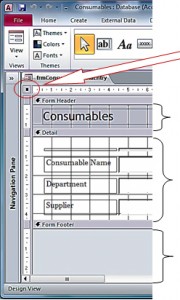Form Object select button
Form Header
Form Detail
Form Footer
There are four main parts to any form.
The Form Object select button selects the form window object. The header, detail and footer are all children of the Form Object. The Form Object links directly to tables and queries and provides that data for the form to display.
The Form Detail section is the area that data is displayed and interacted with. Here we can place textboxes, check boxes, combo boxes, labels, pictures and other data editing controls. Buttons, pictures, audio and other action providers may also reside in the detail area. The Form Detail displays data that is specific to the table or query that the Form Object is Bound to. Detail can either display a record’s data in controls or display a list of records in datasheet view.
In Form Header and Form Footer we can place controls that are not specific to a single record; perhaps labels with the form’s title, buttons that allow record navigation in the Form Detail. Commands like Delete Record can be placed in any of these sections but their controls cannot be bound to the data. The Form Footer is often used to contain summary data about the data in the Form Detail; for example, a running total of a column/field. You can put any controls in any section of the form but their behaviour, especially with regards to displaying data, changes according to the nature of that particular section.
We hope this post has helped you to understand how the design view of a form is structured.
Related Posts
Dyamically Updating A Combo Box From Another Combo Box FormsHyperlinking To A Form Forms
Sorting And Filtering Forms Forms
Working With Form Objects Forms
